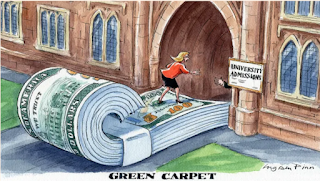Literature Review #4

Deresiewicz, William. Excellent Sheep: The Miseducation of the American Elite and the Way to a Meaningful Life. Free Press, 2015.
Summary
In his book, Excellent Sheep, William Deresiewicz describes how elite colleges are failing to serve student and society. Having received an elite education at Columbia University and taught English at Yale, Deresiewicz uses his experience at Ivy League schools to deliver an indictment of top-tier higher education. He regards elite college education as a mere extension of elite high school education with students who are obsessed with good grades and resume padding rather than finding their true passions. Deresiewicz is critical of craven conformity that leads elite graduates to pursue the same, monotonous career in financial sector. Furthermore, he explains that the sense of entitlement that merit bestows upon the elite class serves to justify the accrual and maximization of personal wealth as individuals who graduated from elite schools are deemed the “best and brightest”. He shows that this trend has occurred alongside the marketization of higher education in the United States and that such change has led colleges to forget their larger education role and foster a commercial rather than pedagogical relationship with their students.
In his book, Excellent Sheep, William Deresiewicz describes how elite colleges are failing to serve student and society. Having received an elite education at Columbia University and taught English at Yale, Deresiewicz uses his experience at Ivy League schools to deliver an indictment of top-tier higher education. He regards elite college education as a mere extension of elite high school education with students who are obsessed with good grades and resume padding rather than finding their true passions. Deresiewicz is critical of craven conformity that leads elite graduates to pursue the same, monotonous career in financial sector. Furthermore, he explains that the sense of entitlement that merit bestows upon the elite class serves to justify the accrual and maximization of personal wealth as individuals who graduated from elite schools are deemed the “best and brightest”. He shows that this trend has occurred alongside the marketization of higher education in the United States and that such change has led colleges to forget their larger education role and foster a commercial rather than pedagogical relationship with their students.
Author
William Deresiewicz was a professor of English at Yale for ten years and a graduate instructor at Columbia, where he also went to college, for five years. Having spent 10 years at Yale, he had the opportunity to see and talk with his students, which helped him pave the direction into writing about how elite education is not really serving their purposes very well. His essay “The Disadvantages of an Elite Education” has been viewed more than one million times online.
Key concepts
Quotes
“You cannot say to a Yalie ‘find your passion,’” a former student wrote me. “Most of us do not know how and that is precisely how we arrived at Yale, by having a passion only for success” (Deresiewicz, 11).
Key concepts
- Stanford Duck Syndrome: Phenomenon first described at Stanford University in which a college student appears calm on the surface when in reality he or she is frantically struggling to keep up with the overwhelming demands placed upon them.
- Triangular desire: “wanting something because you see that other people want it and assume that it must be valuable” (Deresiewicz, 21). It could be applied to the phenomenon of parents and students who crave for admissions to elite universities because the entry is competitive.
Quotes
“You cannot say to a Yalie ‘find your passion,’” a former student wrote me. “Most of us do not know how and that is precisely how we arrived at Yale, by having a passion only for success” (Deresiewicz, 11).
“Yale students are like stem cells. They can be anything in the world, so they try to delay for as long as possible the moment when they have to become just one thing in particular. Possibility, paradoxically, becomes limitation” (Deresiewicz, 18).
“As Harry R. Lewis, the former Harvard dean, has written, nobody wants to take a chance on a class they might not ace, so nobody is willing to venture beyond the things they already know and do very well. Experimenting, exploring, discovering new ways to look at the world as well as new capacities within yourself—the things a college education is supposed to be about—fall by the wayside. Nobody wants to let any of the dozen balls they’re juggling drop; nobody wants to lag behind in the credentials race” (Deresiewicz, 22).
“Now it’s all become a kind of rain dance that is handed down from generation to generation, an empty set of rituals known only to propitiate the gods. Kids do them because they know that they’re supposed to, not because they, or anybody else, actually believes in them. If students were told that they needed to stand on their heads to get into Harvard, they would do so as eagerly, as diligently, as skillfully, and as thoughtlessly as they do everything else (Deresiewicz, 56-57).
Value
This book is essential for my research as it explains how elite education can fail to truly educate students. In an era of marketization, students have learned to favor colleges that can represent them as the “best and brightest” and attain high salary jobs. In fact, the elite students tend to seek low-risk paths to success constituted by affluence, prestige, and marketable credentials. Many are so afraid of failure that they avoid taking career paths without reliably high salaries. As elite education is packaged and sold at a high price, we begin to forget that it shouldn’t be something consumed but something experienced.

Comments
Post a Comment